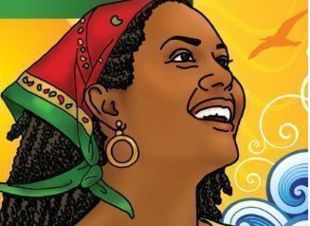Righting Her-Story: Caribbean Women Encounter the Bible Story (Patricia Sheerattan-Bisnauth, editor), is the most recent text on women, theology and biblical interpretation and application in the Caribbean.

Billed by its publisher, World Communion of Reformed Churches, as a bible study training guide which also advises on worship services and liturgy, the text comprises a wide range of social issues reflected in bible stories, stories of Caribbean women, women’s leadership in church and society, issues of women’s sexuality, relevant songs and poems and even resources for a campaign on violence against women.
The studies were written by lay and ordained women from Baptist, Congregational, Evangelical, Presbyterian, Reformed, Roman Catholic and United traditions. Writers are mostly from within the Caribbean region, and include two women from the Caribbean Diaspora in North America, one Asian woman from India and one African American woman from the U.S.A.
By pulling together Church, doctrine, theology and society, the text further roots the ‘woman question’ in the articulation of Caribbean Theology which, itself, is anchored in the principles, philosophy, morals and practice of social justice.
The text gives life to the bible and women of the bible by grounding them in the everyday life of Caribbeanwomen and at the same time, grounding Caribbean women in the life experiences of the women of the bible.
It therefore, alerts us to the fact that women’s experiences bear similarities, regardless of time, space and socio-culture. In so doing, Righting Her-Story undermines the patriarchal interpretation of biblical doctrine and with that the tendency of some Caribbean theologians to spiritualise biblical interpretation and to de-contextualise the life experiences of their adherents.
Worse yet, such theologians have tended to avoid the social teachings of New Testament narrative and so have not always paid sufficient attention to marginalised social groups, in this case women. Righting Her-Story, objectively, distances itself from interpretations which have disregarded women in the social teachings of the church.
What the text does, at one and the same time, is to spiritualise and de-spiritualise women and theology, indicating that while there can be ‘pure theology’, of social import is the contextualisation of theology, an applied contextual theology which means understanding one’s own context and through theological reflection link it into a wider understanding of the gospel message.
This makes it possible to create a link between theological interpretations and socio-political analysis and to bring theological categories in line with the context of specific situations. But while context underlies all presentations, the text itself should be understood in the context of an ‘applied contextual theology’, which enables it to address and, perhaps, even solve social and personal problems.
At the same time, Righting Her-Story recognises the dual ideological manifestations of biblical doctrine. That is to say, while religion is understood, by some, as a conservative and repressive force for all women, it is embraced by others as a source of liberation and social justice.
For example, the Rev Gillian Wilson, of the United Theological College of the West Indies, in her chapter, “Womanhood: A Bible Study on Proverbs 31” interrogates the bible and the book of Proverbs in terms of the dual representation of women and notes:
“The women we glimpse in Proverbs 31 differ significantly from the women referred to throughout the book. On the whole, the women outside of Proverbs 31 are seen as inconsequential, disreputable untrustworthy and fatal to the well-being of men.” (p. 115).
However, when she decides to situate the text in the context of the Caribbean reality, she concludes:
“When we read the text at the face value we find the qualities that the Israelite society might have expected from a woman which would qualify as a good or wise woman. When we read the text from a Caribbean woman’s perspective of a single woman who heads a household and who enters the fray every day competing in an androcentric society as well as competing with members of her own sex, we find aspects of liberation and oppression.” (pp.115-116).
This is not unusual because if we examine the history of Caribbean society, we can conclude that Christianity in all epochs has had both liberating and conservative moments. That is to say, as ideology, Christianity is at the same time a critique of an oppressive social order and an instrument of domination subject to varying interpretations by different classes and social groups and subject to varying historical conditions.
Wilson, therefore, has provided a relevant context for understanding the contradictory nature of Christian thought, advocating at the same time, the liberating dimension of biblical doctrine. This is a theme which runs through the text. Righting Her-Story, then, comes at a time when more and more the liberating message of the Gospel needs to be centred in both church and society.
Righting Her-Story is much more than a pedagogical tool. It is a call to action and a critical way of doing theology. Like other works which focus on articulating a ‘woman’s theology’, Righting Her-Story is calling on the Caribbean Church to embrace a “specific option for women” and begin the process of transformation in its own ecclesial structure as well as that of society.
By interpreting and reinterpreting the Scriptures through the eyes of women, the authors of this text have distinguished themselves by contributing to writing Caribbean theology which envisages a just and inclusive society.
Judith Soares, PhD, is tutor coordinator of the Women and Development Unit of the University of the West Indies.


About Judith Soares
JudithSoares,PhD,istheheadoftheUniversityoftheWestIndies'WomenandDevelopmentUnit.










